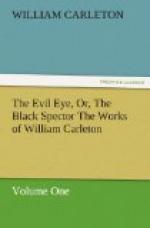“There was a meeting,” says he “(at which I was present), in the city, upon the occasion of the discovery of some attempt to stifle the evidence of the witnesses (about the Popish plot), and tampering with Bedlow and Stephen Dugdale. Among the discourse Mr. Bedlow said ’he had letters from Ireland; that there were some tories to be brought over hither, who were privately to murder Dr. Oates and the said Bedlow.’ The doctor, whose zeal was very hot, could never hear any man after this talk against the plot, or against the witnesses, but he thought he was one of the tories, and called almost every man who opposed him in his discourse a tory—till at last the word became popular. Hume’s account of it is not very much different from this.
“The court party,” says he, “reproached their antagonists with their affinity to the fanatical conventiclers of Scotland, who were known by the name of Whigs.* The country party found a resemblance between the courtiers and the Popish banditti in Ireland, on whom the appellation of tory was affixed. And after this manner these foolish terms of reproach came into public and general use.”
* The word whig is taken from the fact, that in Scotland it was applied to milk that had become sour; and to this day milk that has lost its sweetness is termed by the Scotch, and their descendants in the north of Ireland, whigged milk.
It is evident, from Irish history, that the original tories, politically speaking, belonged to no party whatever. They were simply thieves, robbers, and murderers on their own account. Every man’s hand was against them, and certainly their hands were against every man. The fact is, that in consequence of the predatory nature of Irish warfare, which plundered, burned, and devastated as it went along, it was impossible that thousands of the wretched Irish should not themselves be driven by the most cruel necessity, for the preservation of their lives and of those of their families, to become thieves and plunderers in absolute self-defence. Their habitations, such as they were, having been destroyed and laid in ruins, they were necessarily driven to seek shelter in the woods, caves, and other fastnesses of the country, from which they issued forth in desperate hordes, armed as well as they could, to rob and to plunder for the very means of life. Goaded by hunger and distress of every kind, those formidable and ferocious “wood kernes” only paid the country back, by inflicting on it that plunder and devastation which they had received at its hands. Neither is it surprising that they should make no distinction in their depredations, because they experienced, to their cost, that no “hosting,” on either or any side, ever made a distinction with them. Whatever hand was uppermost, whether in the sanguinary struggles of their rival chiefs, or in those between the Irish and English, or Anglo-Irish, the result was the same to them. If they were




